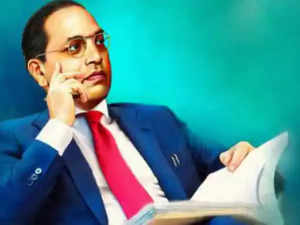
But what is lesser-known about him is his expertise in economics. Ambedkar had a doctorate degree in economics each from America's Columbia University and the London School of Economics. He was briefly also a Professor of Political Economy in the Sydenham College of Commerce and Economic in Mumbai.
As an economist, Ambedkar was not beholden to a particular school of thought or -ism. For economic growth and the upliftment of the poor, he was willing to use an idea that was needed in a given context.
Ambedkar expresses this idea thus in the election manifesto for 1952 general elections of his Scheduled Castes Federation reads: “For the purpose of increasing production, the Scheduled Castes Federation will not be bound by dogma or any pattern. The pattern of the industrial enterprise will be a matter regulated by the needs, the time and circumstances. Where national undertaking of the industry is possible and essential, the Scheduled Castes Federation will support national undertaking. When private enterprise is possible and national undertaking not essential, private enterprise will be allowed. Looking at the immense poverty of the people of this country no other consideration except that of greater production and still greater production can be a primary and paramount condition."
Below are some of Ambedkar's important economic ideas:
Monetary policy
Ambedkar's thesis at the London School of Economics was 'The problem of the rupee: Its origin and its solution'. Ambedkar joined issue with the famous economist of the times John Maynard Keynes who had argued for a gold-exchange standard for India. However, Ambedkar argued for a gold standard instead of the gold exchange standard, saying the government under the gold exchange standard had unregulated scope to manipulate the currency. He argued for minting gold coins which could stabilise currency rates and prices.
Public finance
In his Columbia University dissertation 'The Evolution of Provincial Finance in British India', Ambedkar analysed the colonial financial system and the Centre-state financial relations. He explained the problems with the centralization of government finance and unproductive expenditure by the government. Ambedkar talked about a diarchy where the Centre collected the revenue while the provinces were responsible only for expenditure. He argued that each level of government should raise its own revenue for its expenditure.
Ambedkar also outlined an ideal for public expenditure in what is known as Ambedkar's Canon of Public Expenditure. He called for a qualitative analysis of public expenditure and not just a quantitative one where public money can be spent on unproductive expenditure. He argued that public expenditure should be based on the principles of faithfulness, wisdom and economy.
Agriculture
In an essay on farming and farm holdings, Ambedkar suggested solutions for solving the problems of India's agricultural sector at that time. But his ideas on India's agricultural economy continue to be relevant even today. Ambedkar said that the low productivity of agriculture in India was mainly due to the small size of land holdings. He argued for consolidation of land holdings in bigger units which could be managed by the state or farmers cooperatives. Bigger land holdings would be efficient in production and could reduce cost of production and achieve economies of scale. The hidden unemployed labour in the agricultural sector, Ambedkar said, should be used in the industrial sector.
Download The Economic Times News App to get Daily Market Updates & Live Business News.
Subscribe to The Economic Times Prime and read the ET ePaper online.
Read More News on
Download The Economic Times News App to get Daily Market Updates & Live Business News.
Subscribe to The Economic Times Prime and read the ET ePaper online.









 Get Unlimited Access to The Economic Times
Get Unlimited Access to The Economic Times
